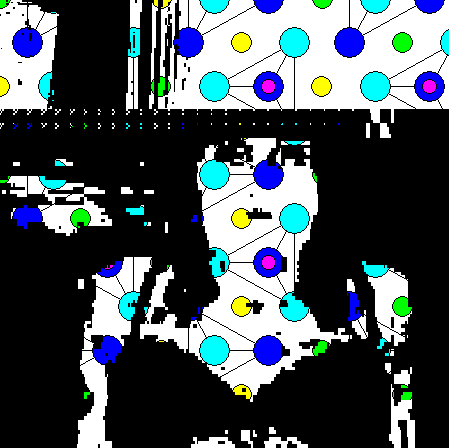We are having some belated discussion of the Great Internet Sleepover and the pros and cons of the "surf clubs" over at Paddy Johnson's blog.
Art Defacement 101
The website Gawker has hired an urban planner as an art critic, apparently believing that having a doctorate in one field automatically qualifies one to hold court in others, like the Professor on Gilligan's Island. Commenting on the recent wave of taggers defacing other taggers (presumptively all in the name of art), Dr. Currid offers this not very well informed prognosis:
When it comes down to it, the Splasher(s) and his/her/their ilk (those who believe commercially successful artists are sell-outs) come across as losers who are pissed that their artwork wasn't good enough to get its own gallery show so they had to destroy someone else's. These stunts are the straw man equivalent of hating the Prom Queen because she's beautiful but pretending it's because she's a bimbo.
Dr. Currid is hereby referred to the Dadaist tradition of defacing artworks that extends from Duchamp's mustache on the Mona Lisa through Rauschenberg's erased De Kooning drawing to possibly even the spraypainting of Guernica (which the late critic Paul Taylor argued was a performance work that needed to be considered in the context of late 60s/early 70s antiestablishment practices--however lame it might be). These art historical precedents could bear some reevaluation in light of the "hating the Prom Queen" theory.
Bosko Blagojevic comments on his blog about Dr. Currid's assumption that good commerce makes good art. Thanks to him for including a link to my Art for All video, which is an electronic defacement of some taggers hired by Target.
Duncan Hannah

The Second Mrs. DeWinter
2007
Oil on canvas
18 x 28 inches
At James Graham & Sons through October 6.
Is this really neutrality?
From Open Left:
[...] Steve Jobs is eyeing a piece of the spectrum we fought for earlier this year and helped set partially free.
The company has $14B in cash (reserve price for the spectrum is $4.6B), is looking for a way to get around the carriers, and likes to control the user experience from end-to-end. Certainly it must annoy Jobs to no end that his beautiful products must operate on such a shitty set of networks. Apple may even partner with Google; Eric Schmidt, Google's CEO, is on the Apple board. I don't know if Apple will make their network open; certainly it's less certain to do so than Google, though probably more likely to do so than, say, Verizon.Still, it's probable that several Silicon Valley companies will bid, including but not limited to Google. Should one of them win the spectrum and build out an open network, this increases dramatically the changes of an overall win on net neutrality. Once we get real competition in wireless broadband, game set match for the worst of the cable and telecom nonsense. We'll still have a lot of work to do, but the darkest scenarios will never come to pass.
After all, net neutrality is really just a regulatory solution to a lack of competition in broadband markets. If you introduce real competition, there's less of a problem with net neutrality anymore. Art Brodsky in his latest amazing column compared the choices you get in this country, which usually boils down to two providers at most, such as Verizon or Comcast, to the choices you get in a country like England that has a sane policy of 'open access' for its internet infrastructure.
Trust Apple, trust Google. Somehow I don't think "treating all packets equally" is the same thing as having four monster providers vying to control your content every step of the way, but I'm just a civilian. More when I read Brodsky's amazing column. (In a few years I hope you'll come visit me on the "slow lane.")
sketch_a4 (dutch remix)

the colored "background" pattern came from a website for Prof. Steven Dutch's Earth Science class
